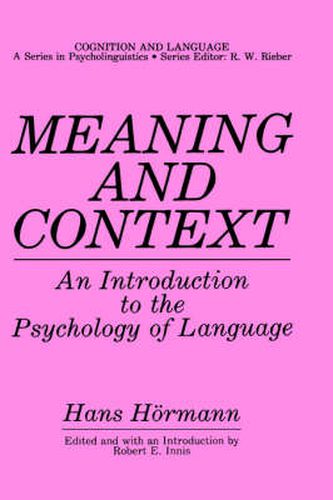Readings Newsletter
Become a Readings Member to make your shopping experience even easier.
Sign in or sign up for free!
You’re not far away from qualifying for FREE standard shipping within Australia
You’ve qualified for FREE standard shipping within Australia
The cart is loading…






This title is printed to order. This book may have been self-published. If so, we cannot guarantee the quality of the content. In the main most books will have gone through the editing process however some may not. We therefore suggest that you be aware of this before ordering this book. If in doubt check either the author or publisher’s details as we are unable to accept any returns unless they are faulty. Please contact us if you have any questions.
At the time of his death Hans Hormann, then Professor of Psy- chology at the Ruhr University, Bochum, West Germany, was pre- paring an English language version of his Eirifilhrung in die Psycholinguistik. The goal of this book, in both the German and English editions, was to present in compact and readily accessi- ble form the essentials of his approach to the psychology of lan- guage. Basing his work upon the materials treated at length and in depth in two previous comprehensive and more technical works, Psycholinguistics: An Introduction to Research and Theo- ry and To Mean-To Understand, Hormann had made a selection of themes and problems suitable for beginners and for those who wanted a convenient introduction to the specific framework with- in which Hormann thought psycholinguistics was to be pursued. The result is a remarkably clear, succinct, and provocative account of central issues and options of the psychology of lan- guage, that broad and not strictly delimited part of psychology that takes as its domain the multiform conditions, processes, and structures involved in the acqUisition, development, production, and grasp of linguistic meaning. Hormann’s approach is admit- tedly contentious and goes directly against a great deal of Anglo- American psycholinguistics. In particular, it radically devalues the relevance of certain types of theoretical linguistics, prin- Cipally, though not exclusively, Chomskyan, for the psychology of vii viii PREFACE language.
$9.00 standard shipping within Australia
FREE standard shipping within Australia for orders over $100.00
Express & International shipping calculated at checkout
This title is printed to order. This book may have been self-published. If so, we cannot guarantee the quality of the content. In the main most books will have gone through the editing process however some may not. We therefore suggest that you be aware of this before ordering this book. If in doubt check either the author or publisher’s details as we are unable to accept any returns unless they are faulty. Please contact us if you have any questions.
At the time of his death Hans Hormann, then Professor of Psy- chology at the Ruhr University, Bochum, West Germany, was pre- paring an English language version of his Eirifilhrung in die Psycholinguistik. The goal of this book, in both the German and English editions, was to present in compact and readily accessi- ble form the essentials of his approach to the psychology of lan- guage. Basing his work upon the materials treated at length and in depth in two previous comprehensive and more technical works, Psycholinguistics: An Introduction to Research and Theo- ry and To Mean-To Understand, Hormann had made a selection of themes and problems suitable for beginners and for those who wanted a convenient introduction to the specific framework with- in which Hormann thought psycholinguistics was to be pursued. The result is a remarkably clear, succinct, and provocative account of central issues and options of the psychology of lan- guage, that broad and not strictly delimited part of psychology that takes as its domain the multiform conditions, processes, and structures involved in the acqUisition, development, production, and grasp of linguistic meaning. Hormann’s approach is admit- tedly contentious and goes directly against a great deal of Anglo- American psycholinguistics. In particular, it radically devalues the relevance of certain types of theoretical linguistics, prin- Cipally, though not exclusively, Chomskyan, for the psychology of vii viii PREFACE language.